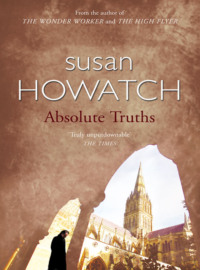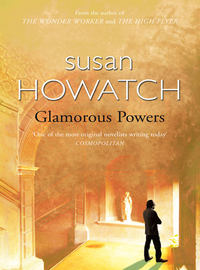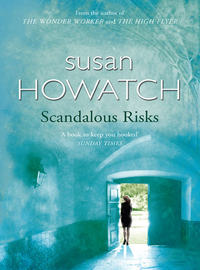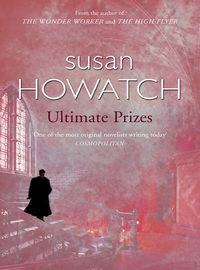
Полная версия
Glittering Images
‘Where does Miss Christie come from?’ I said, changing the subject to soothe her uneasiness.
‘Rural Norfolk – one of those places where there’s lots of inbreeding and everyone talks in grunts. She has a clerical family background, of course.’
‘How suitable. But Mrs Cobden-Smith, one thing does puzzle me about Miss Christie: why has she never married?’
‘Ah!’ said Mrs Cobden-Smith. ‘That’s what we’d all like to know! There’s a rumour that she was once badly jilted, but I think she put that story in circulation to cover up a far less respectable reason for staying single.’
‘Oh?’ I said. ‘And what would that be?’
‘I strongly suspect,’ said Mrs Cobden-Smith, lowering her voice confidentially, ‘that Miss Christie has a lust for power.’
IV
The sense of an absurd anti-climax was so strong that I had to fight a desire to laugh but fortunately Mrs Cobden-Smith was more anxious to explain her theory than to see if I kept a straight face.
‘Of course the popular rumour,’ she was saying, ‘is that Miss Christie’s secretly in love with Alex, but that’s nonsense because I can’t see her being such a fool as to waste ten of the best years of her life being hopelessly in love with a married man. No, you mark my words, Dr Ashworth, she’s mad about power. Some women are; not all women want to marry, and I think Miss Christie simply loves being in charge here, running the palace, looking after Carrie, helping the Bishop, meeting all the Church dignitaries and all the aristocratic guests like the Starmouths. In my opinion,’ said Mrs Cobden-Smith decisively. ‘Miss Christie’s merely an unusual example of a modern woman who’s wedded to her career.’
Having conquered my fou rire I could see now that Mrs Cobden-Smith’s theory was not so absurd as I had supposed; it was certainly more attractive than Lady Starmouth’s wild assertion of lesbianism. However before I could make any comment Mrs Cobden-Smith exclaimed: ‘Ah, there’s Carrie – downstairs in time for luncheon, thank God! And there’s Willy with George. Will you excuse me, Dr Ashworth? I must see George eats his horsemeat.’
She set off briskly across the lawn, and as soon as I was alone I became aware that I was uncomfortably hot. I decided to cool off in my room before lunch while I reviewed the evidence produced in such profusion by my interviews.
By the time I reached the terrace Mrs Cobden-Smith had disappeared with the Colonel and George, but Mrs Jardine was waiting for me with her warmest smile. Now that I knew more about her the smile seemed poignant, and again I was aware of reality submerging itself beneath illusion in the heat of that Starbridge noon.
‘How are you, Mrs Jardine?’ I said as I mounted the steps to the terrace. ‘I was sorry to hear you were feeling so tired.’
‘Oh, I’m much better now, thank you! So stupid about my insomnia, I must have had too much coffee by mistake last night, and then after I’d gone to bed I started thinking about your poor wife and the baby and … Well, you know how it is, I dare say, when one’s thoughts go round and round, especially in the early hours of the morning, and suddenly I felt so frightened, I don’t know why, I do get moments of panic sometimes, especially when the weather’s so hot. Do you think there might be a storm coming, Dr Ashworth? The air’s very sultry, so close and threatening, and I feel as if something dreadful’s going to happen.’
The sky was cloudless and although the air was hot there was little humidity. I said gently, ‘I agree it’s very warm – shall we go inside?’ and I gestured to indicate she should precede me into the house but Mrs Jardine hesitated, looking uncertainly up and down the terrace. ‘I was wondering if we should have drinks out here,’ she said, ‘but I can’t make up my mind. Alex never drinks at midday but my brother and sister-in-law do and so do the Starmouths. Do you drink at midday, Dr Ashworth?’
‘Not usually, no.’ Beyond the open French windows Miss Christie and the butler were entering the drawing-room. I heard Miss Christie say: ‘No, it’s too hot outside, Shipton,’ and the butler set down his tray of glasses on a side-table.
‘Lyle says it’s too hot out here,’ said Mrs Jardine, relieved that the decision had been taken out of her hands. She called to Miss Christie: ‘Dr Ashworth doesn’t drink cocktails at midday either, dear, so we’ll be one extra for lemonade.’
‘Yes, I’d anticipated that,’ said Miss Christie, coming out on to the terrace to join us. ‘Good morning again, Dr Ashworth. I hope you’ve been enjoying sunbathing in a clerical suit.’
‘I have indeed,’ I said. ‘In fact the morning’s been so enjoyable that I’m resolved to have an equally enjoyable afternoon. Will you come for a drive with me after lunch?’
Miss Christie had given an inch and I had taken a yard. At least no one could accuse me of wasting my opportunities, but Miss Christie showed signs of regretting the conceded inch. Without hesitation she said: ‘I’m not a free agent, Dr Ashworth. I have my duties here at the palace.’
‘Oh, but I shall only be resting this afternoon!’ protested Mrs Jardine. ‘Do go for a drive with Dr Ashworth, dearest – why not!’
‘Why not indeed?’ said a familiar harsh voice, and swinging round I found that Dr Jardine was watching me from the threshold of the drawing-room.
V
There was a pause. I glanced back at Miss Christie but she had already reached the practical decision that it was now less awkward to accept the invitation than to refuse it. She said politely: ‘Thank you. A drive would be very pleasant,’ and then she escaped past the Bishop into the drawing-room where the butler had just deposited a large jug of lemonade.
‘It’s abominably hot, isn’t it?’ said Jardine as I watched both the butler and Miss Christie disappear into the hall. ‘Carrie, you look on the verge of sunstroke. Come in at once.’
‘I feel so odd, Alex –’
‘I propose we launch an immediate assault on the iced lemonade.’
The shade of the drawing-room came as an exquisite relief, but as Mrs Jardine sat down on the edge of the sofa I noticed the nervous movements of her hands and sensed her tension more strongly than ever.
‘Well, Dr Ashworth!’ said Jardine, passing a glass of lemonade to his wife and holding out a second glass to me. ‘Do I assume that the glories of the Cathedral library left you cold? As far as I can gather you’ve spent the morning talking to one attractive woman and you now propose to spend the afternoon talking to another.’
I said with a smile, ‘Having spent well over an hour admiring the glories of the Cathedral library, I felt entitled to spend far less than an hour –’
‘– admiring the glories of Lady Starmouth. Quite.’ The Bishop was taking care to sound amused but I sensed his amusement was wafer-thin and I began to feel uneasy.
‘But I thought you were talking to Amy, not Lady Starmouth!’ said Mrs Jardine to me. She sounded abnormally confused.
‘Oh, Dr Ashworth’s been talking to just about everyone!’ said the Bishop, and I could now clearly hear the acid note in his voice. ‘He seems to be suffering from an ungovernable urge to display the gregarious side of his nature!’
‘He hasn’t been talking to me,’ said Colonel Cobden-Smith entering the room as I began to wonder if Lady Starmouth had lodged a complaint about my interrogation.
‘That’s because you’ve been exercising that unfortunate hound in this appalling heat and offering yourself as a candidate for a heart attack – and now I suppose you’ll say you want a pink gin!’
‘The heat’s so bad for everyone,’ said Mrs Jardine in an agony of anxiety before the Colonel could reply. ‘I’m sure there’s going to be a storm, but according to the weather forecast –’
‘Oh, for heaven’s sake, Carrie!’ exclaimed the Bishop in a paroxysm of irritability. ‘Stop talking about the weather!’
Mrs Jardine began to cry.
‘Ye gods and little fishes,’ muttered Jardine as the Colonel and I stood transfixed, and yelled at the top of his voice: ‘Lyle!’
In walked Miss Christie. It was almost as if she had been waiting in the wings for her cue.
‘Lyle, Carrie can’t take this heat. Do something, would you?’ said the Bishop, and stooping awkwardly over his wife he kissed her before murmuring, ‘I’m sorry.’
‘Darling,’ said Miss Christie to Mrs Jardine, ‘you must drink all your lemonade at once and then you’ll feel better. It’s very important to take lots of liquid in hot weather.’
Jardine remarked: ‘Maybe I should take lemonade regularly to prevent irascibility after an arid morning in my study. I’ve just been reading the latest crop of letters on the Marriage Bill from people who think I was the clergyman in charge of Edward VIII’s wedding, and I’m now wishing more fervently than ever that my deplorable namesake had been called by any name other than Jardine.’
This was a skilful attempt to manipulate the conversation back within the bounds of normality, but before a more relaxed atmosphere could be established Mrs Cobden-Smith swept in. ‘Willy, George won’t eat that horsemeat. Do you suppose – oh my goodness, what’s going on? Carrie dear, you simply must make more effort! I know the heat’s trying, but –’
‘Amy,’ said the Bishop, ‘would you kindly stop addressing my wife as if she were an Indian peasant ripe for civilization by the British Raj?’
‘Well, really, Alex!’
‘Mrs Cobden-Smith,’ said Miss Christie with unprecedented charm, ‘I wonder if you’d be terribly kind and help me take Carrie upstairs to lie down? You must have had such a broad experience of heatstroke in India and I’d so value your advice – should we call the doctor?’
‘Quite unnecessary,’ said Mrs Cobden-Smith, greatly mollified, ‘but perhaps she does need to lie down. Come along, Carrie.’
The chaplain then chose an unfortunate moment to rush into the room with bad news. ‘Bishop, the Archdeacon’s on the phone again and he’s in a frightful panic!’
‘Oh, hang the Archdeacon!’ exploded the Bishop. ‘And hang that abominable instrument the telephone!’ But he seized the chance to make a swift exit from the chaos caused by his irritability.
VI
I was surprised how quickly order was restored. Coaxed by Miss Christie, Mrs Jardine drank all her lemonade and said she felt better. The Starmouths arrived, and while they debated what to drink I could hear the Cobden-Smiths discussing George who presently made a lacklustre entrance. Miss Christie summoned the butler to replenish the lemonade jug, but before I had the chance to speak to her about our outing four guests appeared from various corners of the diocese and all opportunity for private conversation was curtailed.
Lunch passed smoothly if tediously. I busied myself by being sociable with a large matron whose favourite topic of conversation was the Mothers’ Union, and although Miss Christie never looked in my direction I occasionally caught Lady Starmouth’s sympathetic glance across the table.
However, by half-past two the party had dispersed and I was preparing in my bedroom for a country excursion far removed from a clerical duty. Off came my clergyman’s uniform. Having pulled on my coolest informal clothes I unbuttoned my shirt at the neck, adjusted the angle of my hat and once more turned to survey my image in the long glass. Immediately I wondered if I had gone too far with the informality; I fancied I looked like a commercial traveller taking a rest from hawking some dubious product, but when I decided to wear a tie I felt much too hot. Shoving the tie back in the drawer I undid the top button of my shirt again and made up my mind that I looked exactly what I was: an off-duty clergyman about to take a pretty woman for a drive in the country.
But then I looked in the glass and saw the spy beyond the clergyman, the image beyond the image, and beyond the spy was yet another man, the image beyond the image beyond the image. Reality blurred; fantasy and truth became inextricably intertwined. I told myself I had imagined the distant stranger but as I felt my personality begin to divide I covered my face with my hands.
Sinking to my knees by the bed I whispered: ‘Lord, forgive me my sins. Deliver me from evil. Help me to serve you as well as I can.’ After that I felt calmer, and when I glanced again in the glass I found that the off-duty clergyman was now the only visible image. He was wearing a severe expression as if to stress that I had no business to let the heat addle my brain, and immediately erasing all morbid thoughts from my mind, I set off to meet Miss Christie.
FIVE
‘Experience has made it certain that the clergyman’s wife must either throw in her lot unreservedly with her husband’s difficult and distinctive career, and reap her reward with a range and depth of personal influence which are unequalled in the case of any other married woman, or she must separate herself from his work and life with consequences ruinous both to his success and to her own credit, and, we must add, to the happiness of both.’
HERBERT HENSLEY HENSON
Bishop of Durham 1920–1939
The Bishoprick Papers
I
Miss Christie was wearing a pale-green short-sleeved frock, which exposed her slim arms, and flat white sandals, which emphasized her slender ankles. Other fleshier curves were erotically concealed beneath the prim cut of her frock. She was sheltering beneath a wide-brimmed straw hat.
‘Trying not to be recognized?’ I said as we met in the hall.
‘I might ask you the same question!’
‘Well, at least you haven’t said –’
‘– “Oh, how different you look out of your clericals!”’
We laughed, and as I led the way outside to my car it occurred to me that if Miss Christie could cope with every conceivable crisis in an episcopal household she could cope with a Doctor of Divinity who was mad enough to be afraid of his own reflection. Conscious of relief, happiness, nervous anticipation and sexual desire in pleasantly stimulating proportions I decided the afternoon was going to be a success.
Miss Christie suggested that we might drive to Starbury Ring, a megalithic stone circle high on the Downs, and after she had directed me out of the city we headed up the valley to the north. The surrounding hills curved with a voluptuous smoothness in the limpid afternoon light. Leaving the main road we passed some farms and once were trapped behind a slow-moving cart, but otherwise nothing deflected our attention from the steadily unfolding views.
Suddenly Miss Christie said, ‘I ought to take Mrs Jardine for a drive like this. It would do her good. We could even take a picnic and disappear for an entire afternoon.’
‘What about the Bishop?’
‘Oh, I’d leave him behind. He hates eating alfresco. His idea of relaxation is to write a letter to The Times.’
‘I hear that was how he made his name before he became Vicar of St Mary’s, Mayfair.’
‘Yes, he didn’t have much else to do when he was a chaplain in North London.’
I saw the chance to pursue my investigation. ‘No one’s yet explained to me,’ I said, ‘why he was living in such obscurity before the translation to Mayfair. What happened to him after he was ordained?’
‘He was given a parish in this diocese – in the slums of Starmouth. He stayed there for seven years and made a success of it, but it was desperately hard work and in the end his health broke down.’
‘That often happens to clergymen in sordid parishes,’ I said, and the next moment I was remembering my friend Philip’s accusation that I lived in an ivory tower. Some guilty impulse drove me to add: ‘However, you mustn’t think I speak from experience. I’m afraid my ministry’s always been among the affluent.’
‘Christ preached to the rich as well as the poor, didn’t he?’ Miss Christie said composed. ‘And Dr Jardine says that spiritually the rich can be just as impoverished as any family on the dole.’
I glanced at her with gratitude but she was looking out of the side-window at the curving hills. After a pause I said, ‘Tell me more about Dr Jardine – what happened when his health broke down?’
‘On the doctor’s advice he resigned his living and borrowed the money to take a long holiday. The rest helped but he still didn’t think his health could stand the strain of another parish so he decided to do some writing and research at Oxford. I expect you know he’s a Fellow of All Souls. However his financial difficulties in those days were so acute that he had to have some sort of benefice, and finally the Warden of All Souls got him this obscure hospital chaplaincy in North London – the living was in the gift of the College.’
‘I gather Dr Jardine had considerable family obligations in Putney.’
‘He was supporting his father, his stepmother and his two sisters,’ said Miss Christie drily. ‘Although he didn’t starve he was hardly well nourished. However the chaplaincy suited him – the hospital was very small, no more than a large alms-house, and as there wasn’t much work to do he used to spend the days in the middle of the week up at Oxford. He wrote some articles, preached various guest-sermons – he already had a reputation as a preacher – and sent letters regularly to The Times. Eventually, without Dr Jardine’s knowledge, the Warden of All Souls approached Mr Asquith, who was then Prime Minister, and asked him if something could be done to improve the situation since it was obvious that Dr Jardine’s health was quite restored. Mr Asquith had been enjoying the letters to The Times and he immediately remembered that the new vacancy at St Mary’s was in the gift of the Crown.’
‘That’s what we clergymen call an edifying story,’ I said. ‘After many vicissitudes the good get their reward.’
‘I can’t see why you should sound so envious,’ said Miss Christie as if she felt she had been too friendly and was now obliged to redress the balance. ‘You’re obviously in line for the choicest of bishoprics.’
‘You think so?’ I said. ‘I’m flattered. But do you honestly believe I’m fit to be a bishop just because I’ve published a book on the Early Church and can survive at Cambridge Cathedral without quarrelling with the Dean?’
‘Oh, I wouldn’t presume to judge your fitness, Dr Ashworth. I leave that to God and Dr Lang.’
I knew I had to demonstrate that I was not prepared to tolerate an asperity drummed up by a guilt that we should be getting on so well. Grinding the car to a halt I switched off the engine, swivelled to face her and demanded, ‘Why the hostility?’
She went white. At first I thought she was white with anger but then I realized she was white with alarm. When she protested, ‘I’m not hostile!’ I said at once, ‘No – so why pretend?’ and leaning forward I kissed her on the mouth.
This was fast behaviour for a gentleman on a sedate afternoon drive with a lady he had known less than twenty-four hours, and for a clergyman the behaviour was so fast that I felt I was travelling at the speed of light. Indeed my speed so stunned Miss Christie that for the first five seconds after our lips touched she behaved as if she were paralysed. Five seconds is a long time when two mouths are joined in a kiss. However on the sixth second the response came, and contrary to my expectations the response was far from hostile. Her mouth opened beneath mine. At once I pulled her closer, but the next moment she was shoving me aside and with reluctance I let her go. Her face was no longer white but a pale pink. I had no idea what colour my face was but I felt as if I had run a hundred yards at high speed, and my mind was swirling not only with thoughts of empty champagne glasses but with images of bright swords, dark tunnels and other ambiguous objects blighted for all time by Freud.
Miss Christie smoothed her skirt – which I had not touched – and as she did so I noticed that she wore a signet-ring on the third finger of her left hand. Finally she said, ‘We met yesterday for the first time. We’re not even on Christian-name terms. Aren’t you behaving a little curiously for a clergyman?’
‘At least I now know you well enough to call you Lyle.’
‘Dr Ashworth –’
‘My name’s Charles. Yes, of course I’m behaving curiously for a clergyman, but whenever someone makes a remark which implies a clergyman should be some sort of stainless-steel saint I want to quote Shylock’s speech from The Merchant of Venice – you know the one, the speech where he says he bleeds and suffers just as other people do –’
‘Well, I wasn’t implying –’
‘Weren’t you?’
‘Dr Ashworth –’
‘Charles.’
‘– I’m afraid I’m simply not a candidate for a whirlwind romance –’
‘No, don’t pretend you’re not interested in me! I saw you listening with bated breath last night when Lady Starmouth asked if I had a wife!’
‘I –’
‘Look.’ I adopted my calmest, most rational manner. ‘I could proceed in the conventional way. I could pay you nice, safe little compliments and write you harmless little billets-doux and send you flowers and come down to Starbridge every fortnight to take you out to tea – I could do all that; I’m perfectly capable of behaving like a gentleman and playing the game according to the rules, but where would it get me? Absolutely nowhere. I found that out last night when I made that mild approach and you dodged away around the coffee-cups. Well, dodging around the coffee-cups may be great fun for you, but frankly I’m not prepared to be treated as a minor inconvenience. I want to get to know you very much better as soon as possible – which is why I suggested this drive –’
‘Then why aren’t we driving? I don’t want to spend all afternoon in front of this five-barred gate while you regale me with impassioned nonsense!’
I started the engine and we drove on.
II
Within minutes we had emerged on to a broad plateau, and ahead I could see a track leading away from the road towards the ridge which marked the summit of the Downs.
‘Stop the car on the verge by that path,’ said Lyle. ‘This is where we begin the trek to the Ring.’
‘There’s no need to sound as if you wished you were chaperoned!’ I said lightly as I halted the car once more. ‘Now that I’ve defined exactly where I stand I promise I’ll behave like a stainless-steel saint for a couple of hours.’
‘What happens after a couple of hours?’
‘We’ll be back at the palace and you can hide behind the Bishop.’
As I opened the passenger door she said, ‘You’re very interested in the Bishop, aren’t you?’
‘Is there anyone in the Church of England who isn’t?’
We set off up the track. I wanted to hold her hand but I exercised an immaculate self-discipline and kept my fists shoved deep in my pockets. However I was not dissatisfied with my progress. At least she had neither slapped my face nor called me a cad nor demanded to be returned immediately to Starbridge.
‘If you want to know me better,’ she said at last, ‘why don’t you set the pace by helping me to know more about you? Most men usually can’t wait to recite their life-histories, but you seem peculiarly reticent.’
‘I didn’t intend this to be a history lesson. I’d rather talk about the present.’
‘What’s wrong with your past?’
‘It’s boring. I was born in the right county in the right residential neighbourhood of one of the right towns. My father has the right sort of profession and my mother indulges in the right sort of hobbies. I went to the right schools and the right university, got myself ordained at the right age and began my right career at the right time with the right man. Then I taught at the right places, wrote the right book and eventually became a Canon of the right cathedral. It’s all very dull, isn’t it? Dr Jardine’s past is so much more interesting than mine.’






